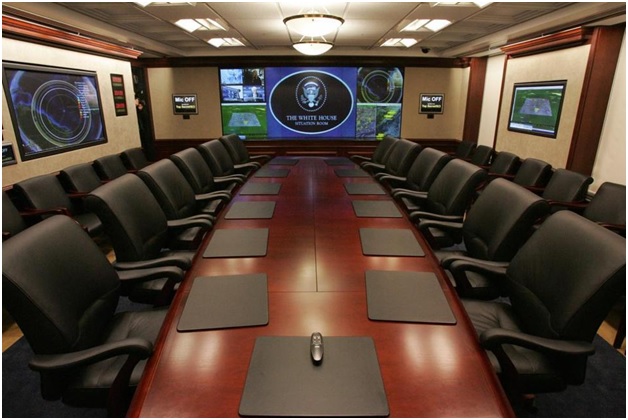
Chinese Aircraft Carrier Development and Strategy: Implications for the United States and its Allies
October 1, 2018
The “Going Out†of Innovation: A Look at U.S.-China Technology Partnerships
October 5, 2018By: Ian Easton |
On October 1, 2018, the People’s Republic of China celebrated its 69th birthday. The Chinese embassy in Washington, D.C. held an event to mark the occasion that was attended by a high-ranking White House official and Marine, Matt Pottinger. During his formal remarks to the assembled dignitaries, the National Security Council’s senior director for Asian affairs, Mr. Pottinger, was quoted as saying, “In the United States, competition is not a four-letter word…We at the Trump administration have updated our China policy to bring the concept of competition to the forefront.”
He was undoubtedly referring to the U.S. government’s new National Security Strategy and National Defense Strategy. Both are remarkably candid documents. They state that the People’s Republic of China (PRC) is a revisionist power and strategic competitor that seeks “to shape a world antithetical to U.S. values and interests.”
These policy declarations should not have come as a surprise. American strategists Andrew Marshall, Robert Kaplan, and Aaron Friedberg predicted U.S.-PRC strategic rivalry well over a decade ago. While the Obama administration prized cooperation over competition, there are indications that it, too, suspected America’s long-standing China policy was failing.
For instance, in February 2016, then Secretary of Defense Ashton Carter said that great power competition had become the Pentagon’s top priority, and he anticipated that it would define the next 25 years. That same month, then Commander of the Pacific Command Admiral Harry Harris testified before the Senate Armed Services Committee that, “I believe China seeks hegemony in East Asia.”
Not everyone in Washington agrees that competition should be the focal point in relations with Beijing. Many influential actors are comfortable with the status quo and opposed to altering their long-held views even though the facts on the ground have changed. What follows are ten reasons why it has become necessary for the U.S. to compete with China.
- The People’s Republic of China is a deeply authoritarian nation, which embraces an ideology that runs directly counter to American values and way of life. If left unchecked, China could become the world’s dominant political, economic, and military power.
- In its 69 years of rule, the Chinese Communist Party has systematically destroyed China’s traditional culture and inheritance as a civilization. This hurts Chinese Americans as their ancestors’ history is being rewritten.
- The founder of the PRC, Mao Zedong, was the worst mass murderer in human history. China’s current civilian and military leaders worship him and seem keen to emulate many of his radical practices.
- The People’s Liberation Army, the armed wing of the Chinese Communist Party, views the U.S. as an enemy. It is tailor-making intelligence equipment and weapons and war-making concepts on this basis. It is also expanding its arsenal of offensive nuclear delivery vehicles.
- The Chinese Communist Party is planning and preparing to invade the Republic of China (ROC, Taiwan). Taiwan is a peaceful, pro-American democracy that has never been administered or controlled by the PRC. The Taiwan Relations Act commits the U.S. to “maintain the capacity…to resist any resort to force or other forms of coercion that would jeopardize the security, or the social or economic system, of the people on Taiwan.”
- The Chinese Communist Party is attempting to subvert America’s democratic system and civil society. It is buying up Hollywood, intimidating universities, and influencing the media in order to get Americans to self-censor. Many already do. And it could get worse.
- China seeks to erode and crumble America’s alliances, which would undermine a key pillar of our national security.
- The Chinese Communist Party and its subordinates steal up to an estimated $600 billion dollars from the United States every year. This is weakening our economy, another key pillar of national security. Further undermining our prosperity, China is fueling the opioid crisis.
- Beijing is building a dystopian future for the world. It is harnessing artificial intelligence technology, big data analytics, and mass surveillance tools to create an Orwellian police state. These instruments of terror are being exported abroad, helping other odious regimes like North Korea, Iran, and Venezuela to maintain their grip on power.
- The Chinese Communist Party has sent an estimated one million innocent people into concentration camps for committing “thought crimes.” It is burning bibles, closing churches, creating splits in the Catholic Church, driving large number of Tibetans to commit suicide, and attempting to eradicate Muslim teachings and practices.
These are just ten of the manifold reasons why the United States and its allies are engaged in a long-term strategic competition with China. Such a competition is only likely to end when the regime in Beijing is overthrown or collapses, revolutionary political reforms follow, and democracy flourishes.
If China follows the Soviet model and transforms into an authoritarian federation, it seems likely that strategic competition will continue. The best hope for the U.S. is that the PRC eventually follows the Taiwan model. The next best would be the Singapore model. No positive future for China is likely absent a long competitive campaign of external pressure.
U.S. government officials are wise to address China’s predatory ascendance in an honest, head-on fashion. Strategic competition is our best option.
—
Ian Easton is a research fellow at the Project 2049 Institute and author of The Chinese Invasion Threat.Â




